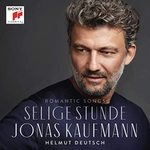|
Back
08/14/2020
“Selige Stunde”
Franz Schubert: Der Musensohn, D 764 – Der Jüngling an der Quelle, D 300 – Die Forelle, D 550 – Wandrers Nachtlied II, D 768
Ludwig van Beethoven: Adelaide, opus 46 – Zärtliche Liebe, WoO 123
Friedrich Silcher:Annchen von Tharau
Felix Mendelssohn: Auf Flügeln des Gesanges, opus 34/2 – Gruss, opus 19/5
Edvard Grieg: Ich liebe dich, opus 41, n° 3
Franz Liszt: Es muss ein Wunderbares sein, S 314
Robert Schumann: Widmung, opus 25/1 – Mondnacht, opus 39/5
Carl Bohm: Still wie die Nacht
Richard Strauss: Zueignung, opus 10/1 – Allerseelen, opus 10/8
Alexander Zemlinsky: Selige Stunde, opus 10/2
Frédéric Chopin (arr. Alois Melichar): In mir klingt ein Lied (after Etude opus 10/3)
Hugo Wolf: Verschwiegene Liebe – Verborgenheit
Antonín Dvorák: Als die alte Mutter, opus 55/4
Johannes Brahms: Da Unten im Tale, WoO 33/6 – Wiegenlied, opus 49/4
Pyotr Ilyich Tchaikovsky: Nur wer die Sehnsucht kennt, opus 6
Wolfgang Amadeus Mozart: Das Veilchen, K 476 – Sehnsucht nach dem Frühling, K 596
Gustav Mahler: Ich bin der Welt abhanden gekommen
Jonas Kaufmann (tenor), Helmut Deutsch (piano)
Recorded in Munich, Germany (April 16–19, 2020) – 71’
Sony Music 19439783262 – Booklet in English and German

   
During a pandemic that has killed hundreds of thousands, finding a silver lining may seem a tad self indulgent. For those of us who are fortunate to be safe and healthy, the disruption is a nuisance at worst in the grand scheme of things. How fortunate are we? Surely the destruction of COVID-19 and its impact on everyday life, politics, culture and people is not close to being measured. The impact on art is one that will be looked back on with fascination and thankfully technology has stepped in to make music available to many of us. The forced migration of performed music from large venues to virtual and intimate spaces has led to great art under trying circumstances, a salve in troubling times This disc from the world’s premiere tenor and his longtime accompanist is a highlight so far.
Jonas Kaufmann’s lieder gifts are formidable. His résumé began with a disc of Richard Strauss lieder (with the same Helmut Deutsch here) that blew me away. Since then, a Winterreiese and Die schöne Müllerin have been standouts in Kaufmann’s discography. Forced to return to a more intimate venue out of necessity, Kafumann and Deutsch chose “warhorses” as they put it in the liner notes for a generous program of Lieder from multiple composers. This description is far too derogatory, however, given the results. I’d say “chestnuts” is more applicable as Kaufmann’s renditions of standards such as Die Forelle or Brahms’ Wiegenlied are anything but standard fare. After all, Kaufmann’s is one of the most thrilling voices in recent memory. His solid technique and intellectual prowess around this music in his native tongue makes each piece, no matter how popular or obscure, into a mini-event.
Take the second track on disc, Beethoven’s Adelaide, as an exemplar. Kaufmann’s controlled, gleaming tenor shapes Beethoven’s well-traveled, yet graceful phrases into a four movement symphony, each line dovetailing neatly into the next. He deploys his vocal power when musically and textually appropriate to the young lover’s longing. The German tenor finds the profundity in each track on this disc, lending his talents to obscure gems such as Carl Bohm’s powerful Still wie die Nacht or the title track, the sensual Selige Stunde by Alexander Zemlinsky. Kaufmann’s renditions of these and more well-known songs such as Schubert’s Der Jüngling an der Quelle leads to several breathtaking moments, due in no small part to Kaufmann’s restraint and judgement on when to fully deploy his strong voice.
Rather than venturing into schmaltz, Kaufmann’s inclination to tread lightly through the passaggio, the vocal range where so many of these songs live, gives these performances a youthful quality. The program brilliantly winds from naive love to longing and resignation, rather than group the tracks by composer. As the depth of expression of the text matures, so does Kaufmann’s range of colors. Credit goes to Kaufmann’s maturity and experience, as well to his longtime collaborator Deutsch who plays with a sensitive touch. They have managed to corral the tenor’s heroic voice, using its stentorian qualities sparingly, and deployed his resources toward not only his alluring head voice but also an abundance of stamina in his phrasing. Take, for instance, the previously recorded Strauss songs Allerseelen and Zueignung. The climax of both pieces were previously show-stopping in duration as one would expect (and hope for), but here the duo breezes through them by comparison, parlaying the entire phrase into a complete thought much more effectively as rhetorical drama. The same applies to the Hugo Wolf pieces. The sparsely accompanied Verschwiegene Liebe is paced quickly, the treacherously exposed phrases ebbing and flowing into cohesion. The brooding Verborgenheit courses forward in seamless legato. The resulting effect is something much more affectingly pitiful than sulky.
All of Kaufmann’s and Deutsch’s techniques culminate in the final piece, Mahler’s Ich bin der Welt abhanden gekommen. The perilous phrasing the composer applied to Friedrich Rückert’s affecting poem never appears to be a concern to Kaufmann. Without benefit of the sustained sounds of an orchestra (not to denigrate Deutsch’s tender playing in the least), Kaufmann soars through the vast vocal range of the piece, intimately drawing the listener closer. Like the others on the program, the Mahler doesn’t sink under the weight of a star tenor; it succeeds due to his artistry and insight. The sound quality is very good, recorded closely in intimate quarters in Munich. The music benefits from such an arrangement, close to most’s composers’ original settings. At around 70 minutes, it is more than a blissful hour of indulgent listening during uncertain times; it feels indispensable.
Matthew Richard Martinez
|